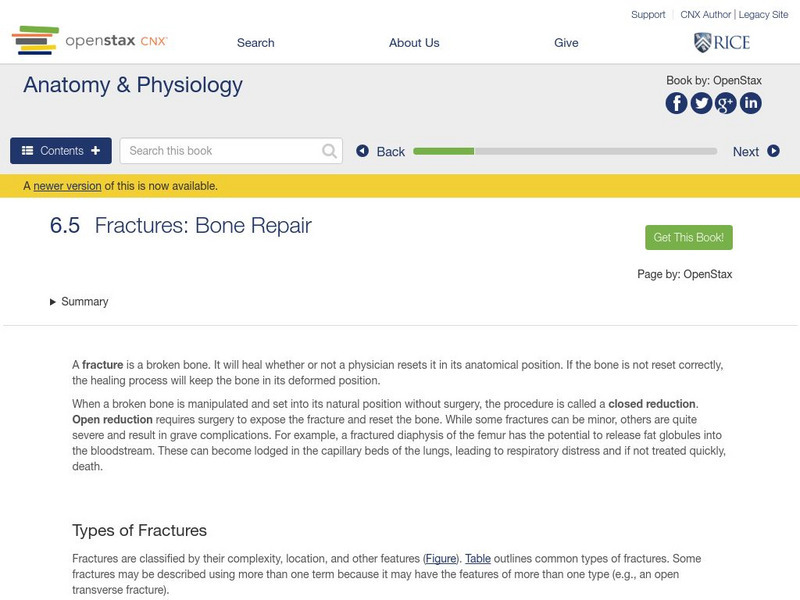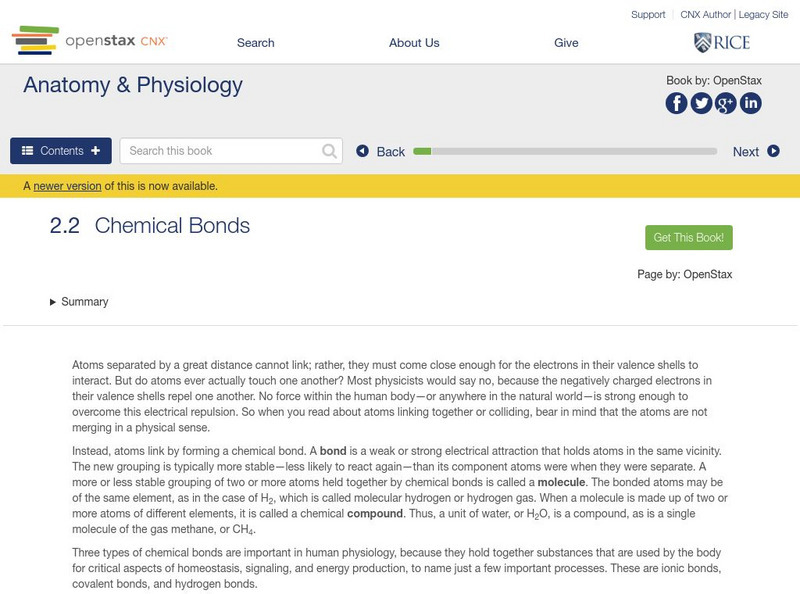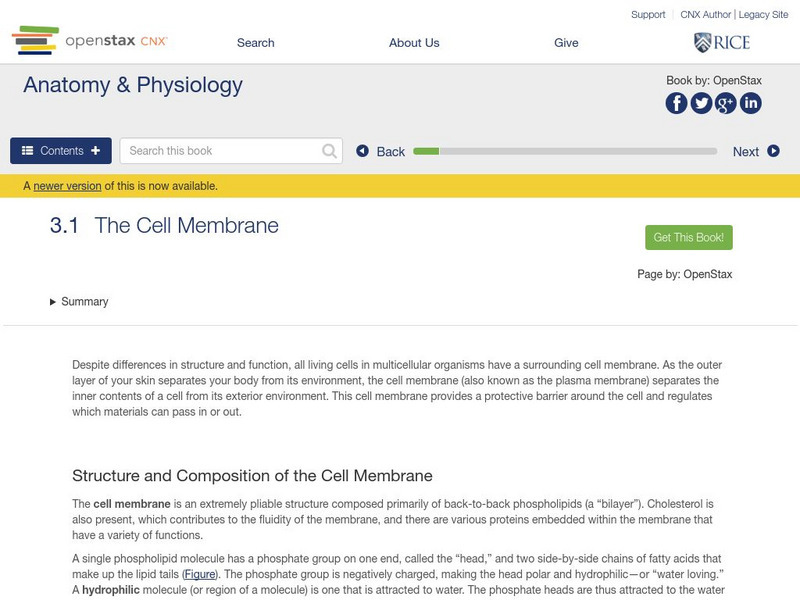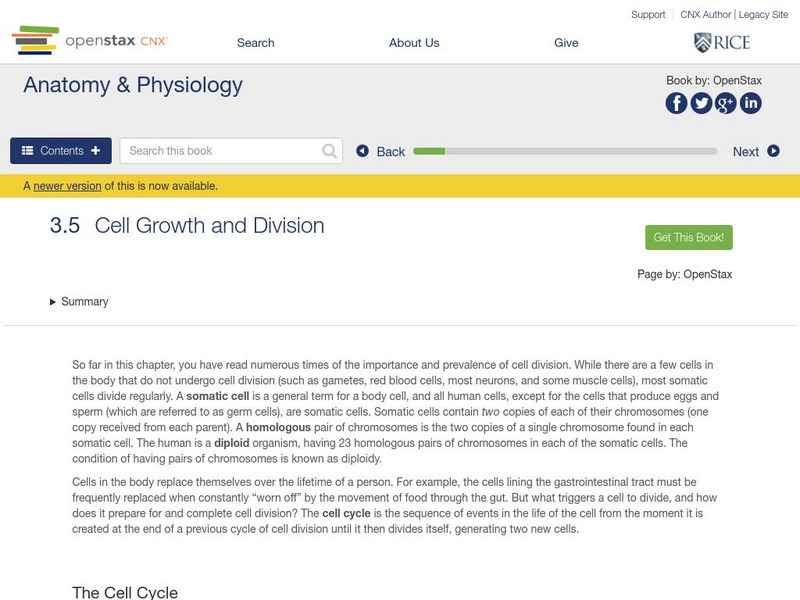US National Library of Medicine
Medline Plus: Spinal Cord Injuries
This Medline Plus site provides a table of contents for all information on the spinal cord and injuries of the spinal cord.
EL Education
El Education: Operation Kidfit Recommendation Report
Students design a health and human body exhibit for a local museum by researching topics such as infectious diseases across history, anatomy, physiology, health, and nutrition. Students visited four museums across the country to...
OpenStax
Open Stax: Homeostasis
This section of a textbook provides information regarding human homeostasis, a process that has the body continuously monitor its internal conditions. Includes a linked video.
OpenStax
Open Stax: Inorganic Compounds
Learn here about inorganic compounds, substances that do not contain both carbon and hydrogen, and how they are essential to human functioning.
OpenStax
Open Stax: Layers of the Skin
Learn here about skin. Skin is made of multiple layers of cells and tissues, which are held to underlying structures by connective tissue.
OpenStax
Open Stax: Fractures and Bone Repair
This site provides a plethora of information regarding fractures and bone repair.
OpenStax
Open Stax: Cytoplasm and Cellular Organelles
The organelles and cytosol, taken together, comprise a cell's cytoplasm. This interactive site provides information regarding cytoplasm and cellular organelles.
OpenStax
Open Stax: Diseases, Disorders, and Injuries of the Integumentary System
The integumentary system is susceptible to a variety of diseases, disorders, and injuries. These range from annoying but relatively benign bacterial or fungal infections that are categorized as disorders, to skin cancer and severe burns,...
OpenStax
Open Stax: Embryonic Development of the Axial Skeleton
The axial skeleton begins to form during early embryonic development. However, growth, remodeling, and ossification continue for several decades after birth before the adult skeleton is fully formed. Knowledge of the developmental...
OpenStax
Open Stax: Development of the Appendicular Skeleton
Learn here about the development of the appendicular skeleton - the appendicular skeleton arises from mesenchyme, a type of embryonic tissue that can differentiate into many types of tissues, including bone or muscle tissue.
OpenStax
Open Stax: Fibrous Joints
Fibrous joints are explained here. At a fibrous joint, the adjacent bones are directly connected to each other by fibrous connective tissue, and thus the bones do not have a joint cavity between them.
OpenStax
Open Stax: Development of Joints
This site introduces you to the developmental process of joint formation.
OpenStax
Open Stax: Development and Regeneration of Muscle Tissue
This site provides an explanation of the development and regeneration of muscle tissue.
OpenStax
Open Stax: Chemical Bonds
Learn here about chemical bonds, a weak or strong electrical attraction that holds atoms in the same vicinity.
OpenStax
Open Stax: The Cell Membrane
Learn here about the structure and function of the cell membrane.
OpenStax
Open Stax: Cell Growth and Division
The following site provides information regarding the process of cell growth and division.
OpenStax
Open Stax: Bone Structure
In this site we examine bone structure. Examine bone cells, markings, tissues and various types of bones.
OpenStax
Open Stax: Bone Formation and Development
This learning module explains bone formation and development. Learn about cartiage, intramembranous ossification, endochondral ossification and bone remodeling.
OpenStax
Open Stax: Bones of the Upper Limb
Learn here about the bones of the upper limb. The upper limb is divided into three regions. These consist of the arm, located between the shoulder and elbow joints; the forearm, which is between the elbow and wrist joints; and the hand,...
OpenStax
Open Stax: Bones of the Lower Limb
Learn here all about the bones that make up the lower limb: the thigh, leg and foot.
OpenStax
Open Stax: Classification of Joints
This site provides information regarding the classification of joints. A joint, also called an articulation, is any place where adjacent bones or bone and cartilage come together to form a connection.
OpenStax
Open Stax: Axial Muscles of the Head, Neck, and Back
The skeletal muscles are divided into two categories: the axial, muscles of the trunk and head, and the appendicular, muscles of the arms and legs. Learn here all about the axial muscles.
OpenStax
Open Stax: Axial Muscles of the Abdominal Wall and Thorax
It is a complex job to balance the body on two feet and walk upright. Learn here all about the axial muscles of the abdominal wall and thorax.
OpenStax
Open Stax: Appendicular Muscles of the Pelvic Girdle and Lower Limbs
This site provides interactive information regarding the appendicular muscles of the pelvic girdle and lower limbs.
Other popular searches
- Heart Anatomy and Physiology
- Anatomy and Physiology Web
- Plant Anatomy and Physiology
- Brain Anatomy & Physiology
- Basic Anatomy and Physiology
- Heart Anatomy Physiology
- Muscle Anatomy & Physiology
- Anatomy & Physiology 1
- Anatomy Physiology Digestion
- Anatomy & Physiology Models
- Anatomy Physiology Digestive
- Anatomy Physiology Wolf

























